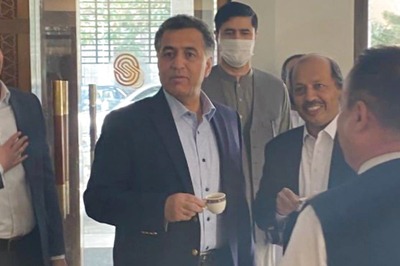
views
New Delhi: The University of Hyderabad is dealing with a peculiar problem which has become a flashpoint between groups of students and the administration — rotis. The need for 'regularisation of roti' has become a pressing issue on the varsity’s campus with some students from north India complaining about rotis not being served regularly.
Posters calling the chief warden ‘Roti Chor’ have sprung up on the campus. Students have also taken to social media, posting ‘chapati updates’.
Ahead of the students’ union elections, the ‘roti issue’ has taken centre stage. Candidates are making promises of “regularisation and refinement of rotis” to woo north Indian students.
This week, while acting on the recent complaints of ‘irregular rotis’, the Akhil Bharatiya Vidyarthi Parishad (ABVP) protested by preparing rotis on campus. News18 spoke to students and administration to understand what made chapati a contentious issue.

ABVP members prepare rotis to protest against ‘irregular' supply. (Photo: ABVP)
WHO STOLE MY ROTIS?
There are around 1,000 north Indian students on campus and most of the staff in the mess is from Hyderabad. Experts in their regional food, many are not trained in making rotis the way the it is prepared in north Indian homes. Complaints about rotis range from being badly prepared to irregularly offered in select hostels.
Abhishek Malhotra, ABVP university in-charge, said the outfit held a protest on campus because rotis are not served often.

Students raise slogans, stage protest calling for rotis to be prepared in hostel messes. (Photo: ABVP)
“It is a central university. There are people coming from across the country and their dietary requirements are not looked into. North Indians are habituated to rotis. At the current rate of roti supply, only few get to eat it,” he said.
He added that the ‘roti issue’ had come up many times and student political bodies had even lent support to it.
“There is still a shortage of staff and rotis. They don’t care about rotis. How did they even apply for the tag of the Institute of Eminence?” he asked indignantly.
In 2015, Rohith Vemula’s Ambedkar Students’ Association wrote to the chief warden regarding the notification of incorporating rotis and North Indian dal in the mess.
IS APPAM, SAMBAR A PROBLEM IN UNIVERSITIES IN NORTH INDIA?
At the center of this 'roti storm' is chief warden Vasuki Belawadi, who is being called ‘Rotichor’. Belawadi wondered if there was a “sambar or an appam problem” simmering in universities in north India where many south Indian students study.
“Hundreds of students from south India go to central universities like JNU. Do they demand Karnataka sambar daily? No, they get paneer and what not to eat,” he said.
The chief warden told News18 that the ‘roti issue’ is a multi-faceted problem.
He said that the university, which was established in 1974, has been providing chapatis since 2010-11 after demands by north Indian students. He added that post the retirement of staff in 2014, the university has been grappling with shortage of manpower.
“Things have not been in shape since 2014. There is acute shortage of staff and despite that we are providing chapatis in some hostels. There is also a cap in the number of people to be employed,” Belawadi said.
“Chapatis are not available in all hostels. How can one place cater to all 29 taste buds?” he said referring to the 29 states and UTs of India. “The menu is decided by students themselves. Cooks upgrade the menu and most of them come from Hyderabad, which is why there are not the ideal rotis on the table."
The chief warden said that despite the issue, the university was cooperating and preparing chapatis.
The President of Students’ Union Sreerag P pointed out that in most messes, rotis are supplied, but because of the large numbers of north Indian students, the administration was unable to cope up.
“Looking at this problem, we wrote to the administration many times to provide trained cooks for perfect and sufficient rotis. As a central university, we cannot leave behind the food quality and demands of students. We will have to be answerable about the food,” Sreerag added.

Students allege that rotis are either badly made or irregularly served (Photo: ABVP).
He said that they were working on building a mechanism to resolve the ‘roti issue’ and explained that purchasing flour was expensive as the Hyderabad University did not get flour at the subsidised rates.
“Despite our representation, the administration has not been able to look into this problem,” he said.
SFI leader Kesavan Sankar Roy Chaudhury was of the opinion that there were a lot regional factors involved in the problem. “I cannot go to West Bengal and say ‘where is my South Indian food’? We need adjustment and administrative planning to deal with the issue of food at large and chapatis too.”



















Comments
0 comment